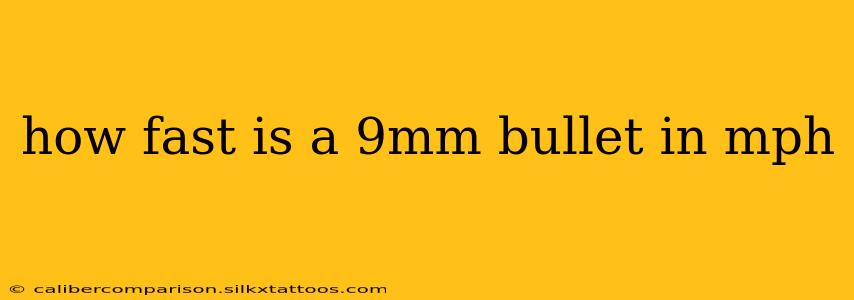How Fast is a 9mm Bullet in MPH? Understanding 9mm Muzzle Velocity and its Implications
The speed of a 9mm bullet isn't a single, fixed number. Several factors influence its velocity, making a precise answer more nuanced than a simple figure. This article will delve into the specifics, explaining the variables that affect 9mm bullet speed and providing a clearer understanding of its performance.
Factors Affecting 9mm Bullet Velocity
Several key factors determine the muzzle velocity (the speed at which a bullet leaves the gun barrel) of a 9mm round, impacting its final speed in miles per hour (mph). These include:
-
Ammunition Type: Different manufacturers produce 9mm ammunition with varying powder charges and bullet weights. A heavier bullet will generally have a lower velocity than a lighter bullet fired from the same firearm, given the same powder charge. Conversely, a higher powder charge will yield a faster bullet, all else being equal. This is the most significant variable.
-
Barrel Length: Longer barrels allow more time for the expanding gases from the gunpowder to accelerate the bullet, resulting in a higher muzzle velocity. Shorter barrels inherently limit this acceleration.
-
Gun Condition: The condition of the firearm itself plays a role. A well-maintained gun will generally exhibit more consistent and higher velocities compared to a poorly maintained one with wear and tear.
-
Environmental Conditions: While less significant than the other factors, extreme temperature variations can slightly affect the burning rate of gunpowder and, consequently, the bullet's velocity.
Typical 9mm Muzzle Velocities
Considering the variability, providing a single mph figure is misleading. Instead, let's provide a range: A typical 9mm round fired from a standard-length barrel will achieve a muzzle velocity between 1000 and 1250 feet per second (fps).
To convert fps to mph, we use the following calculation: fps * (3600 seconds/hour) / 5280 feet/mile.
Using the low end of that range (1000 fps): 1000 fps * (3600/5280) ≈ 682 mph
Using the high end (1250 fps): 1250 fps * (3600/5280) ≈ 852 mph
Therefore, a 9mm bullet's speed typically falls between approximately 680 and 850 mph. Remember, this is a range, and the actual speed can vary based on the factors discussed above.
Understanding the Implications of 9mm Bullet Speed
The velocity of a 9mm bullet is a crucial factor in its effectiveness. Higher velocity generally translates to:
-
Increased Range: Faster bullets travel farther before significantly dropping due to gravity.
-
Greater Energy Transfer: Higher velocity bullets possess more kinetic energy upon impact, resulting in increased stopping power.
-
Flatter Trajectory: A higher velocity allows for a flatter trajectory, making accurate shots at longer ranges easier.
However, stopping power is influenced by factors beyond just velocity, such as bullet construction and its interaction with the target.
Conclusion
The speed of a 9mm bullet is not a single number, but a range dictated by several interrelated factors. Understanding these factors provides a more complete picture of 9mm ballistics, emphasizing the importance of choosing the right ammunition for specific needs and circumstances. Remember to always prioritize safety and handle firearms responsibly.

